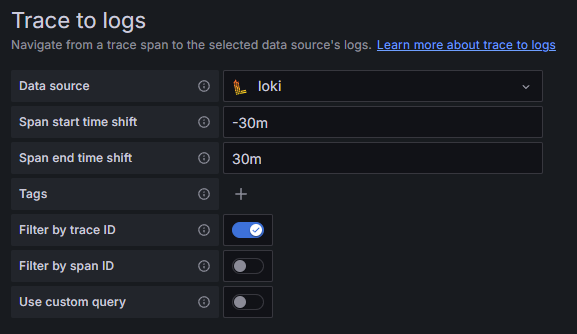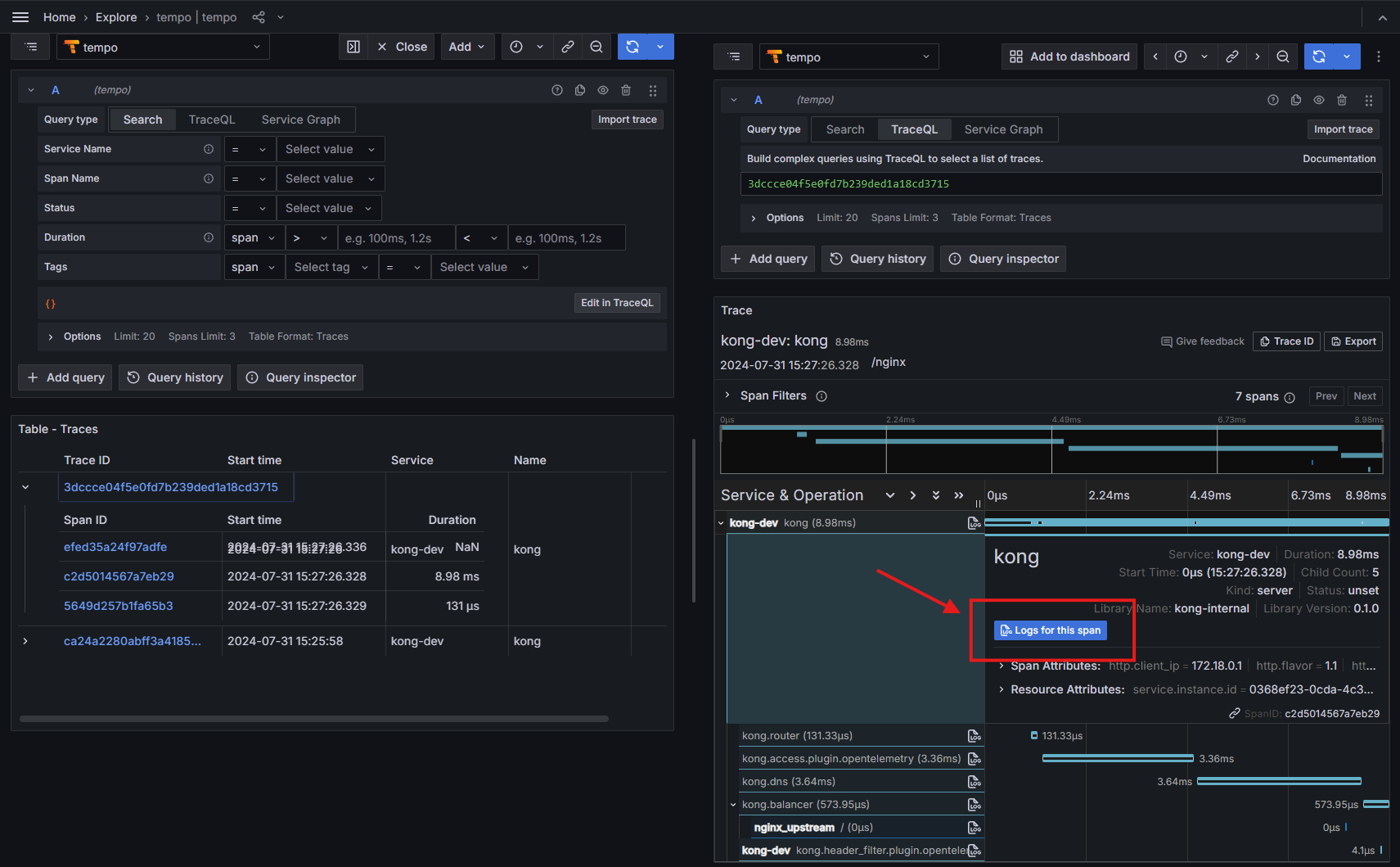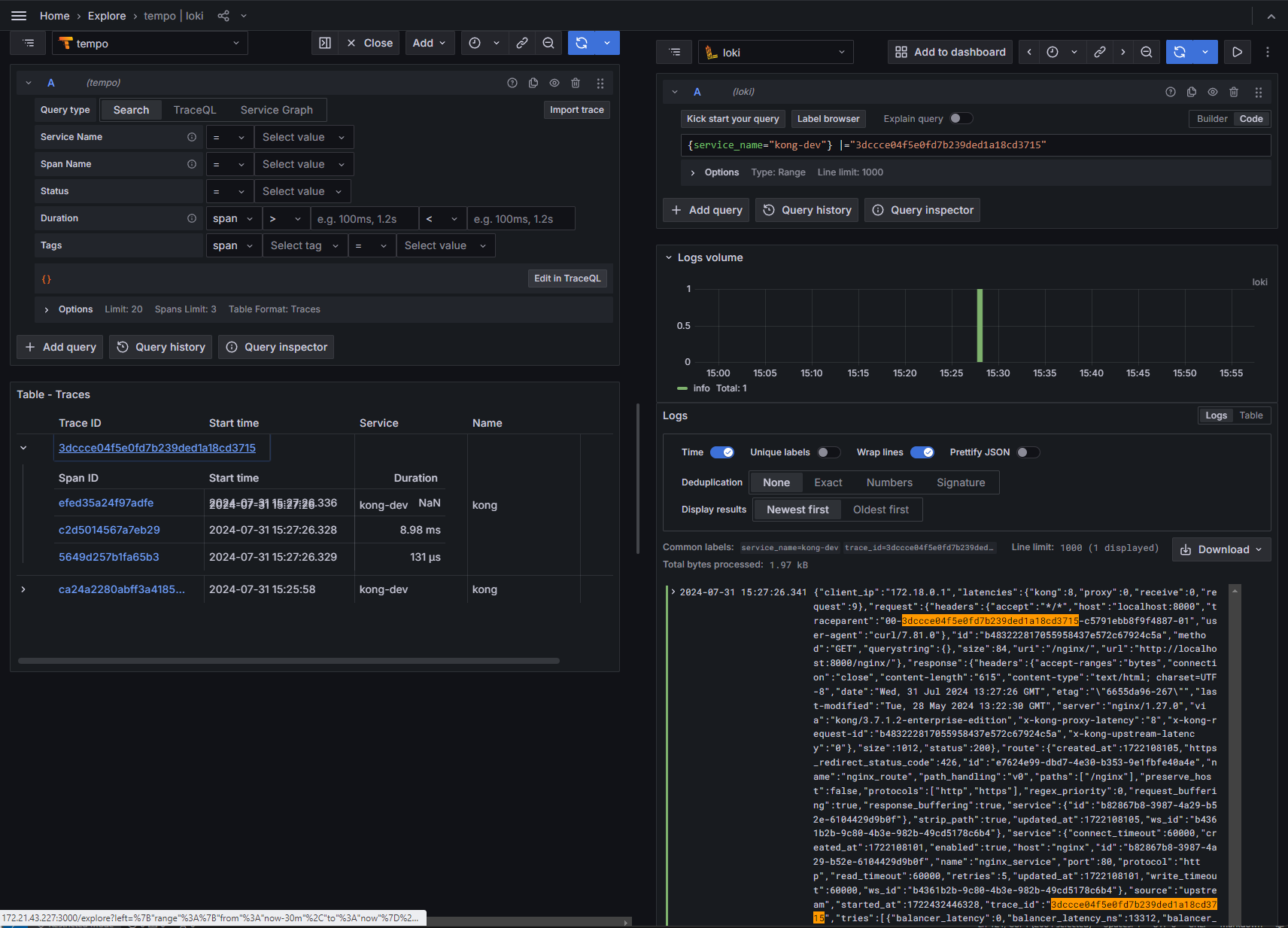Opentelemetry Bonus Tricks
 Bruno
BrunoTable of contents

Convert Kong logs to OTLP format
I faced issues when I worked on logs and the OpenTelemetry protocol.
Kong doesn't provide logs in this format, and to enable Log for the span feature in Grafana, we need to collect logs in the OTLP format.
I used Fluentbit to perform these tasks.
$ cd && mkdir -p ~/opentelemetry_demo/fluentbit && cd ~/opentelemetry_demo/fluentbit
Let's create FluentBit config file
$ cat << EOF >> config.conf
[INPUT]
name http
listen 0.0.0.0
port 8888
[FILTER]
Name lua
Match kong
code function inline_filter(tag, timestamp, record)record.trace_id = record.trace_id.w3c; return 1, timestamp, record end
call inline_filter
[OUTPUT]
name stdout
match *
[OUTPUT]
Name opentelemetry
Match kong
Host otelco
Port 4318
Metrics_uri /v1/metrics
Logs_uri /v1/logs
Traces_uri /v1/traces
Log_response_payload True
Tls Off
Tls.verify Off
logs_trace_id_message_key trace_id
logs_span_id_message_key span_id
EOF
I couldn't collect or create a specific service_name on logs emits by Kong. So, this following did the trick but it's not really an happy path.
I added a processors -> resource -> attributes -> action: upsert on OTEL collector for logging stack.
If a service_name is missing, OpenTelemetry Collector will create a default one.
If anyone has a better solution, please make a comment.
$ cat << EOF >> ~/opentelemetry_demo/otelcol/config.yaml
receivers:
otlp:
protocols:
grpc:
endpoint: 0.0.0.0:4317
http:
endpoint: 0.0.0.0:4318
prometheus:
config:
scrape_configs:
- job_name: 'otel-collector'
scrape_interval: 10s
static_configs:
- targets: ['0.0.0.0:8888']
processors:
batch:
resource:
attributes:
- action: upsert
key: service.name
value: kong-dev
exporters:
otlp:
endpoint: tempo:4317
tls:
insecure: true
otlphttp:
endpoint: http://loki:3100/otlp
prometheusremotewrite:
endpoint: http://mimir:8080/api/v1/push
extensions:
health_check:
pprof:
zpages:
service:
extensions: [health_check, pprof, zpages]
pipelines:
traces:
receivers: [otlp]
processors: [batch]
exporters: [otlp]
logs:
receivers: [otlp]
processors: [resource]
exporters: [otlphttp]
metrics:
receivers: [prometheus]
processors: [batch]
exporters: [prometheusremotewrite]
EOF
Enable Kong HTTP-Log plugin
$ curl -X POST http://localhost:8001/plugins/ \
--header "accept: application/json" \
--header "Content-Type: application/json" \
--data '
{
"name": "http-log",
"config": {
"http_endpoint": "http://fluentbit:8888/kong",
"method": "POST",
"timeout": 1000,
"keepalive": 1000,
"flush_timeout": 2,
"retry_count": 15
}
}
'
Now, create the FluentBit container
$ docker run \
--name=fluentbit \
--hostname=fluentbit \
--network=lgtm \
-p 8888:8888 \
-v $(pwd)/config.conf:/etc/fluentbit/config.conf \
cr.fluentbit.io/fluent/fluent-bit \
--config=/etc/fluentbit/config.conf
Finally, you need to configure the Tempo datasource in Grafana by setting Trace to logs this way :

Now, we can fetch logs from a Kong trace ID.


Subscribe to my newsletter
Read articles from Bruno directly inside your inbox. Subscribe to the newsletter, and don't miss out.
Written by

Bruno
Bruno
Depuis août 2024, j'accompagne divers projets sur l'optimisation des processus DevOps. Ces compétences, acquises par plusieurs années d'expérience dans le domaine de l'IT, me permettent de contribuer de manière significative à la réussite et l'évolution des infrastructures de mes clients. Mon but est d'apporter une expertise technique pour soutenir la mission et les valeurs de mes clients, en garantissant la scalabilité et l'efficacité de leurs services IT.